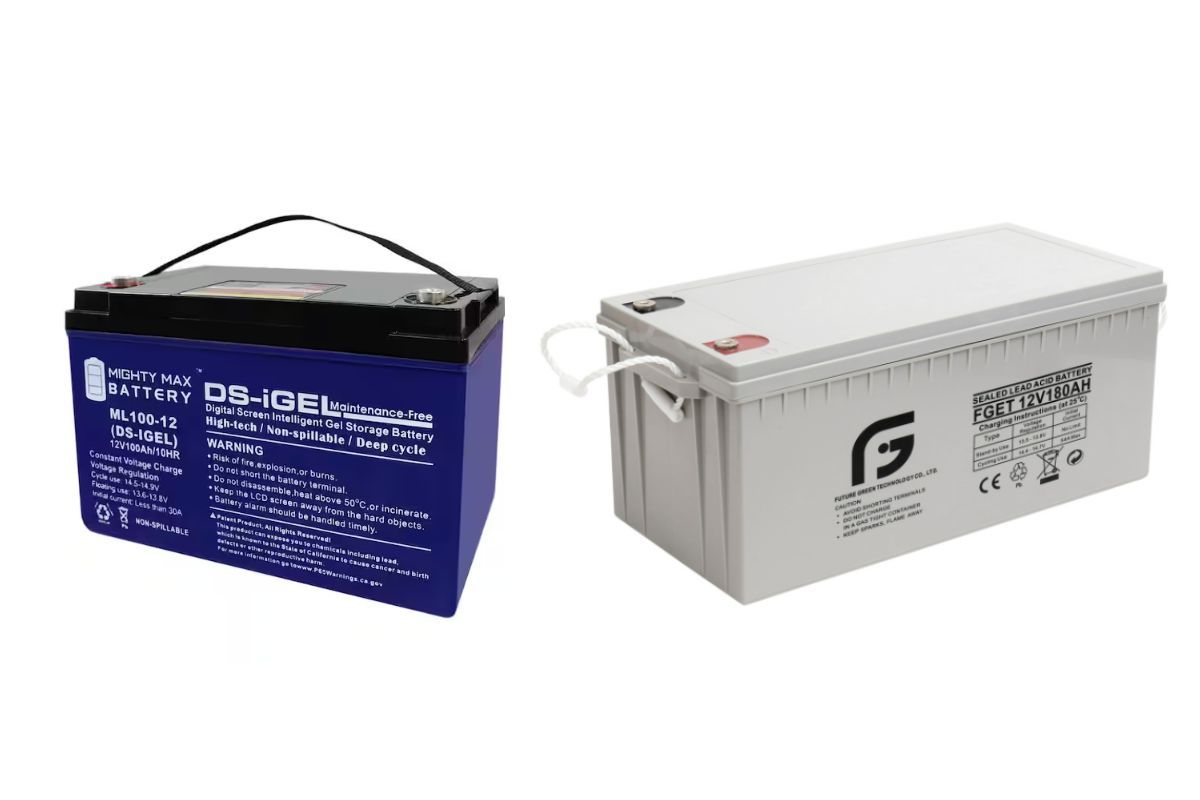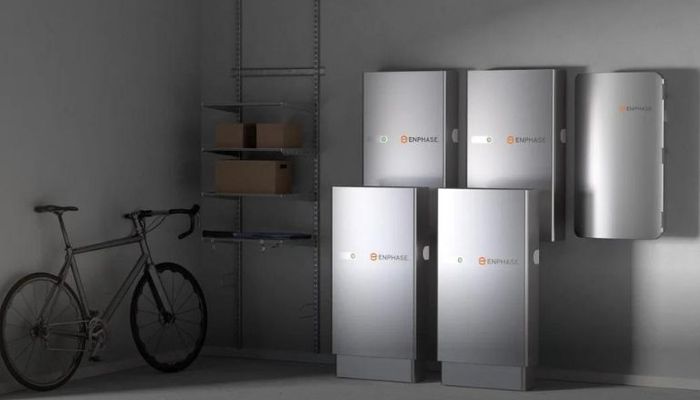Gel vs. AGM Batteries for Solar: What’s Better?

As backup power becomes more essential, many people have been adding energy storage to their grid-tied solar panels. But with so many solar battery types available, it can be difficult to determine what is right for you.
Gel batteries and AGM batteries often get lumped together due to their similarities. However, there are also many differences between them so this article will take an in-depth look at these two technologies.
What Are Gel Batteries?
Gel batteries are a type of sealed lead-acid battery that have a silica-based thickening agent in the electrolyte. This gel-like substance immobilizes the electrolyte, turning it into a semi-solid state. It is this gel electrolyte that gives gel batteries their name.
How Do Gel Batteries Work?
Unlike flooded batteries that have liquid sulfuric electrolyte, the gel-like substance immobilizes the electrolyte, preventing it from spilling or leaking even if the battery case is cracked or damaged. This makes them very vibration-resistant. Also, the gel electrolyte helps to inhibit the formation of gas during charging, reducing the risk of battery swelling or explosion.
Benefits of Gel Batteries
Gel batteries offer several advantages for home solar applications.
- Sealed construction: Gel batteries are sealed and maintenance-free, eliminating the need for regular watering or electrolyte checks.
- Longer service life: They have a longer lifespan compared to traditional flooded lead-acid batteries, thanks to their design that minimizes plate corrosion and extends the battery's cycle life, typically 600-800.
- Deep discharge capabilities: Gel batteries are highly tolerant of deep discharges, making them suitable for situations where the battery might be heavily discharged before recharging.
- Robust and reliable: They are resistant to vibration, shocks, and temperature variations, making them durable and reliable even in harsh environments.
- Safety: The gel electrolyte immobilizes the electrolyte, reducing the risk of spills, leaks, battery swelling, or explosion.
- Suitable for off-grid applications: Due to their deep discharge capabilities and reliability, gel batteries are an excellent choice for off-grid solar systems or remote locations without access to a reliable power grid.
Disadvantages of Gel Batteries
And like every other type, gel batteries aren’t short on disadvantages either:
- Easy to overcharge
- Do not work as well in colder temperatures
- More expensive
When to Use Gel Batteries
If you live in a place with warmer climate, for example southern California, gel batteries will be a great option due to their ability to deal with heat well. Moreover, because of their low discharge rate, gel batteries would also be good for is they will be unused for long periods of time.
What Are AGM Batteries?
AGM stands for Absorbent Glass Mat. Inside an AGM battery, the electrolyte is absorbed into fiberglass mats to prevent leaking or evaporation. AGM batteries are another lead-acid type.
How Do AGM Batteries Work?
The glass mats hold the electrolyte in place close to the negative and positive plates inside the AGM batteries. This allows for a deep discharge without damaging the battery, giving you more usable battery capacity. This also lessens the amount of hydrogen gas released during the discharge cycle.
Benefits of AGM Batteries
- Deep discharge provides more usable capacity
- Perform well in cold temperatures
Maintenance-free: Like gel batteries, AGM batteries are sealed and maintenance-free. They do not require watering or electrolyte checks, making them convenient and hassle-free to use.
Improved safety: The immobilized electrolyte in AGM batteries reduces the risk of acid spills or leaks, enhancing their safety and making them suitable for indoor installations.
Deep cycling capabilities: AGM batteries are designed to withstand repeated deep discharge cycles without significant degradation in performance. They can be discharged to a higher depth of discharge (DOD) compared to some other battery types, making them suitable for applications where maximizing the use of stored energy is important.
Fast charging: AGM batteries have low internal resistance, which allows them to accept a high charge current. This results in faster charging times compared to traditional flooded lead-acid batteries.
Disadvantages of AGM Batteries
- Lower discharge capacity compared to gel batteries
- Do not work as well in warm temperatures as they are prone to thermal runaway
- Lower cycle life (400-500 cycles is typical)
When to Use AGM Batteries
Environments where temperatures will be cooler, like basements or places with cold climates, would be a good fit for AGM batteries. They are also more budget-friendly due to their lower price and deep discharge capabilities.
Gel vs AGM: Which One Is Best for Home Solar?
Both gel batteries and AGM batteries do well in home solar applications, whether they are grid-tied or off-grid.
However, we’d recommend doing your due diligence and look into other battery types as well. While ten years ago the discussion might have ended with a decision between gel and AGM batteries, today all grid-tie battery systems are designed with lithium batteries, and many off-grid as well.
The right battery for your system will depend on many factors including battery bank size, location and which supporting equipment (charger and inverter) you will use.
It also matters how you plan to use the batteries in terms of how often they will be cycled and whether they will be on a float charge when not in use. Budget is also a big consideration.
| Gel Batteries | AGM Batteries | |
| Maintenance | Maintenance-free | Maintenance-free |
| Charge Efficiency | Lower | Higher |
| Discharge Efficiency | Higher | Slightly lower |
| Deep Cycling | Excellent deep cycling capabilities | Good deep cycling capabilities |
| Lifespan | Longer service life | Slightly shorter service life |
| Cost | Higher initial cost | Lower initial cost |
Consult With Seasoned Experts
To make an informed decision and ensure the optimal selection for your solar energy storage system, we highly recommended consulting with experts in the field.
GoGreenSolar, with its expertise and experience, can provide valuable guidance and assistance in choosing the right battery technology for your specific needs. Our team of professionals can assess your requirements, answer your questions, and provide tailored recommendations to help you make the best choice.
Contact GoGreenSolar today and get expert help.






